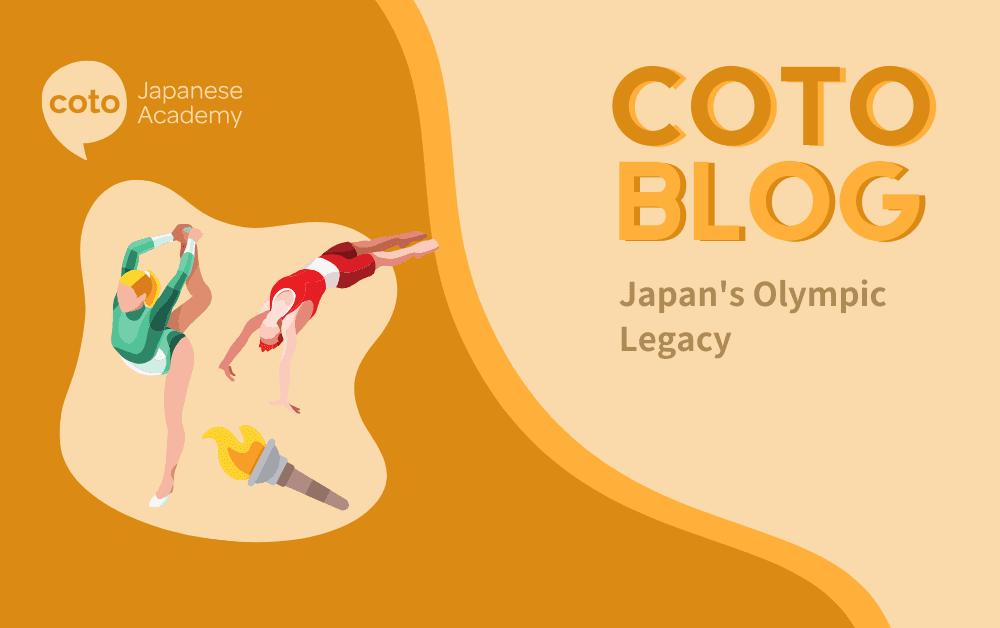Japan, a traditional island nation that’s also very modern, has a strong history of athletic achievement. The Olympics is a worldwide competition where athletes from different countries come together. Japan has used this big stage to show off its outstanding sports skills and to represent the Olympic values of being the best, being friends, and respecting others.
Japan has a rich sporting heritage, from ancient martial arts to contemporary sports. The country’s dedication to discipline, perseverance, and teamwork, often referred to as 武士道 bushido—the way of the warrior—has been instrumental in shaping its Olympic journey. This ethos has produced a steady stream of Olympic champions who have captivated the world with their skill, grace, and determination.
A Quick Jump To…
- A Historical Perspective
- The Modern Era: A New Chapter
- The Road Ahead: Challenges and Opportunities
- Useful Vocabulary and Phrases
- FAQ
A Historical Perspective

Japan’s Olympic story began in 1912 and debuted at the Stockholm Games. While the initial participation was modest, the seeds of a sporting powerhouse were sown. The 1964 Tokyo Olympics marked a pivotal moment, as Japan hosted the Games and emerged as a dominant force, clinching a record-breaking 16 gold medals. This golden era propelled Japan into the global spotlight and ignited a passion for sports among its people.
In the subsequent decades, they witnessed a consistent performance by Japanese athletes across various disciplines. Summer Games have been particularly fruitful, with judo, wrestling, gymnastics, and swimming emerging as strongholds. Japan’s ability to seamlessly blend traditional martial arts with modern athleticism has been a critical factor in its success.
The Modern Era: A New Chapter

The 21st century has ushered in a new chapter for Japanese sports. The 2020 Tokyo Olympics, postponed to 2021 due to the COVID-19 pandemic, presented an unparalleled opportunity for the nation to showcase its resilience and innovation. Despite the challenges, the Games were a resounding success, leaving a lasting legacy regarding infrastructure, technology, and environmental sustainability.
Japanese athletes continued to shine, capturing the hearts of millions with their extraordinary performances. Naomi Osaka in tennis, Kōhei Uchimura in gymnastics, and the Japanese women’s softball team epitomized the spirit of the Games. Their triumphs served as a beacon of hope and inspiration in a world of uncertainty.
The Road Ahead: Challenges and Opportunities
While Japan has achieved remarkable success in the Olympics, the road ahead is challenging. The increasing competitiveness of global sports necessitates continuous improvement and innovation. Developing a robust talent pipeline, investing in cutting-edge training facilities, and fostering a culture of sports participation is crucial for sustaining Olympic excellence.
Moreover, Japan’s commitment to hosting major sporting events, such as the Rugby World Cup and the Olympic Games, has positioned the country as a global sports hub. These events boost the economy and enhance Japan’s international image.
Useful Vocabulary and Phrases
- オリンピック (Orinpikku): Olympics
- 選手 (senshu): athlete
- 金メダル (kin medaru): gold medal
- 銀メダル (gin medaru): silver medal
- 銅メダル (dou medaru): bronze medal
- 優勝 (yushou): victory, championship
- 試合 (shiai): match, game
- 応援 (ouen): support, cheer
- 頑張れ (ganbare): Do your best!
- 競技場 (kyōgijō): stadium
- 観客 (kankaku): spectator
- 開会式 (kaikaishiki): opening ceremony
- 閉会式 (heikaishiki): closing ceremony
- 聖火 (seika): Olympic flame
- ボランティア (borantia): volunteer
- マスコット (masukotto): mascot
- 日本代表、頑張れ! (Nihon daihyou, ganbare!): Go Japan!
- すごい! (Sugoi!): Amazing!
- 感動した (Kandoushita): I was moved
- 惜しかった (Oshikattta): That was close
- 頑張ってください (Ganbatte kudasai): Please do your best
- 素晴らしいプレーでした (Subarashii purei deshita): That was a great play
You Might Be Wondering…
What is the most successful Olympic sport for Japan?
Judo is undoubtedly Japan’s most successful Olympic sport. With its deep-rooted connection to traditional martial arts, Japan has dominated judo competitions for decades.
How has the Olympic Games impacted Japanese society?
The Olympic Games have profoundly impacted Japanese society, fostering a sense of national pride, inspiring young athletes, and promoting physical fitness and health. The 1964 Tokyo Olympics, in particular, marked a turning point, as it showcased Japan’s modernization and economic growth.
What challenges does Japan face in maintaining its Olympic success?
Japan faces increasing competition from other sporting nations, an aging population, and the need to adapt to evolving sports trends. To overcome these challenges, Japan must invest in youth development, embrace technological advancements, and diversify its sporting portfolio.
How does Japan's culture contribute to its Olympic success?
Japan’s culture, characterized by discipline, perseverance, and respect, is deeply intertwined with its Olympic success. The concept of bushido, the warrior’s way, instills a strong work ethic and mental toughness in Japanese athletes.
